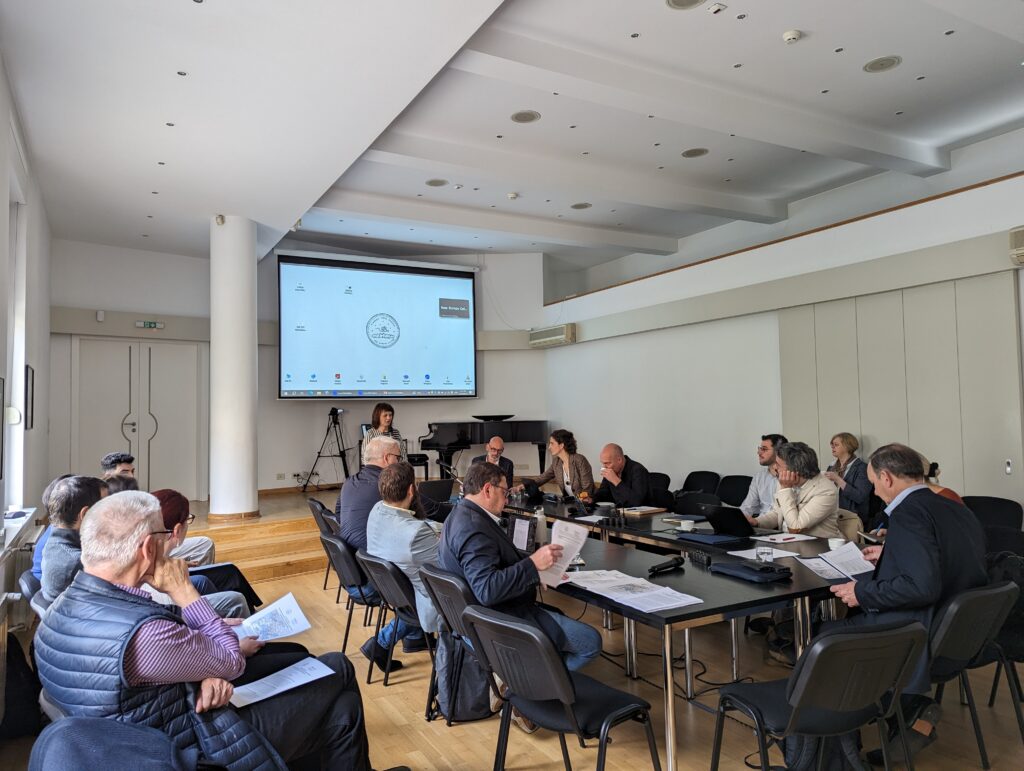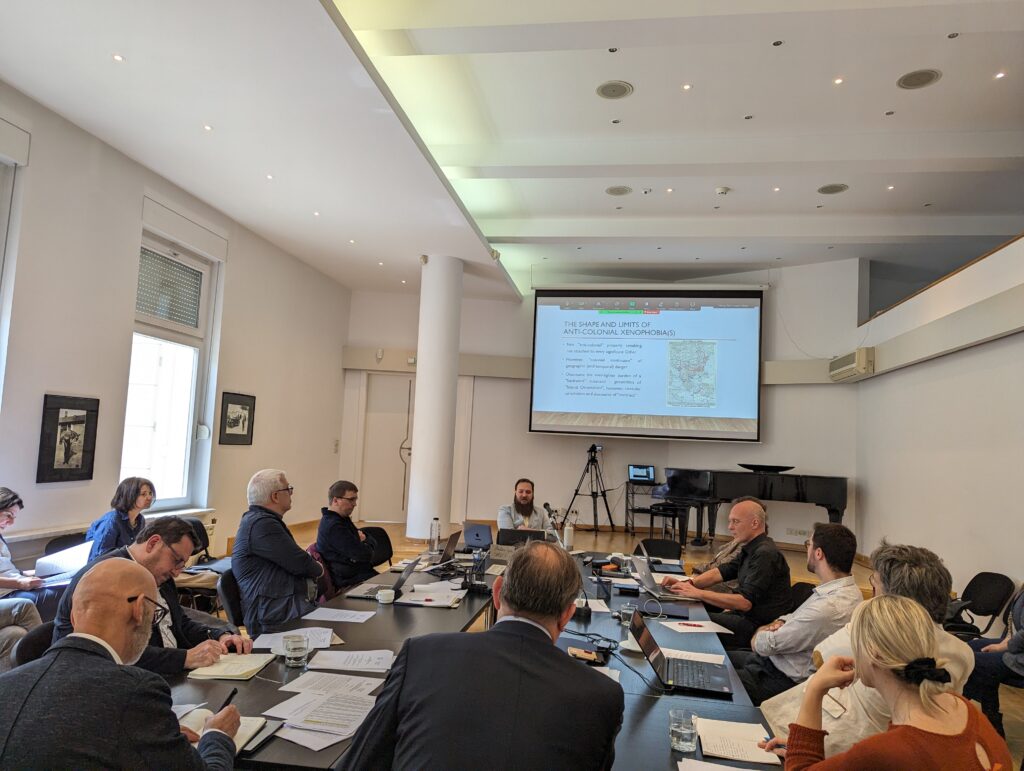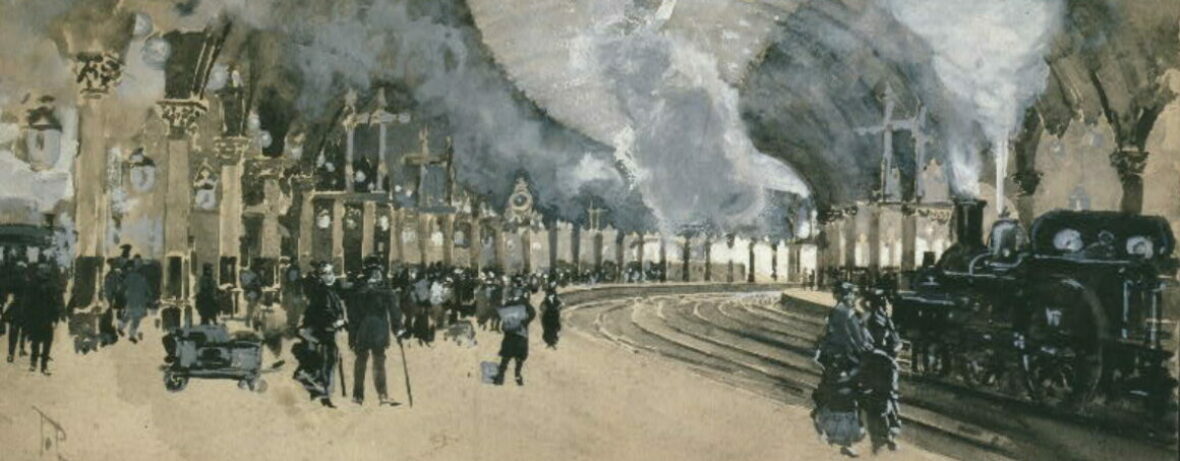On December 12-13, 2024, Silvia Marton and Andrei Sorescu participated to the international conference “Scandals and Politicization of (Anti)Corruption. From Loyal Subjects to Mass Politics (17th-20th Centuries)”, organized at the Autonomous University of Barcelona (GREPIIC-UAB), Spain. Silvia Marton presented the paper titled „“Discontent Grows:” Transportation Infrastructure and Corruption Scandals in the Nineteenth Century in Romania” (video recording). Grounded in a 1875 published pamphlet and the controversies on railway concessions in Romania, her contribution showed that, through its massive interference in the natural, social, and political order, infrastructure construction worked to bring corruption charges under the spotlight. It allowed for society-wide disputes on the overlapping factors conducive to public corruption, from financial-economic factors to moral and political ones, and it led to questioning public norms and ideals. Andrei Sorescu presented the paper titled „How 19th-Century Romanian Nationalism Became Anti-Colonial” (video recording). He examined how Romanian nationalism became “anti-colonial” in the nineteenth century in the context of massive infrastructure investments and construction, and argued for the applicability of the label to the otherwise surprising case of a country that was not, properly speaking, colonized.
On December 12, 2024, team member Toader Popescu gave a talk titled ”Frica de a pierde trenul. Raporturi de putere în planificarea infrastructurii feroviare din România înainte de Primul Război Mondial.” (in Romanian). He examined the conflicting attitudes of local administrations towards the integration of towns into the rail network in the last decades of the nineteenth century. The larger NEC academic community attended the event.
On September 4, 2024, team member Toader Popescu presented the paper ”Urban fringes in the European periphery: railway infrastructure and industrial development in Bucharest at the turn of the century” at the international conference “Cities at the Boundaries” of the European Association for Urban History (EAUH) held in Ostrava, Czech Republic (September 4-7, 2024).
On July 5, 2024, Silvia Marton was a guest lecturer at the Techische Universtaet Darmstadt within KRITIS – PhD Seminar and PhD Colloquium (Summer Term 2024 „Spatialities and Temporalities in Urban Studies and Science & Technology Studies”). She presented her research titled “Railways, Space, Capital, and Power: The Political Imaginaries of Nineteenth Century Romania’s Elite.” She emphasized that building the railways was simultaneously a political and developmental raison d’Etat in Romania. She also showed that it was also a fight for statecraft and sovereignty, and that acceptance of dependence upon European powers turned into resentment after one of the major rail concessions became a national and international scandal in 1870. In doing so, her research explored the ‘corruption’-agency nexus and how the discourse on ‘corruption’ underpinned the immense political and financial effort of giving Romania its long-awaited system of rail transportation.
On June 8, 2024, all team members participated to a video interview, a dialogue with journalist Eugen Istodor from Hotnews (in Romanian). Team members delivered their analysis on the key topics covered by the project and they highlighted the historical salience of transportation infrastructure for the Romanian history in the nineteenth century.
On May 27, 2024, Silvia Marton talked about the difficulties in understanding and studying (political) corruption in contemporary Romania, Euronews interview (in Romanian).
International Conference: Transportation Infrastructure, (Anti)Corruption, and Power Relations in the Nineteenth and Twentieth Centuries – 13-14 May 2024, New Europe College, Bucharest
The conference is organized within the framework of the collective research project ”Colonial Anxieties, Corruption Scandals and Xenophobia in Nineteenth-Century Infrastructure Development in Romania (CanCor)” which examines the historical relevance of transportation infrastructure for the self-imaginings of nation-building and the narratives of modernization in the Romanian Principalities/Romania. Its team members investigate “colonial anxieties” over the possibility that Romania would be subject to economic and even demographic colonization, fears generated by asymmetrical political and economic interactions with Europe’s Great Powers and neighboring empires. The project also studies the corruption scandals surrounding infrastructure construction that generated and constantly reshaped colonial anxieties in the process of nation-state-building and modernization, when faced with perceived imperial and colonial aspirations of political and economic influence. Furthermore, it also seeks to historicize the semantic usages of “colonialism” and “corruption” and their inherently political uses for both nation-building and the process of infrastructure construction, extending as a salient and recurring discursive nexus well into the interwar period.
Key analytical elements of the project are the contested meanings, and the historically constructed and contested layers of key concepts – such as “colonialism”, “corruption”, “modernization”, “infrastructure” – renegotiated in the debates and scandals surrounding transportation infrastructure construction, and technological development in the process of nation- and state-building in Romania. At this international conference, together with presenting the most important conclusions of the team members’ respective research, we seek to broaden the inquiry into the historical layers of these main concepts in other settings in Central-South-East Europe and, more broadly, across the European continent, with a focus on major (transportation) infrastructure projects as prime primary sources for polemics and anxieties.
Aside from the role of infrastructure as a conduit for modernization, development, and (state) centralization, we invite participants (1) to approach the history and role of infrastructure through the lenses of the language of (anti)corruption. Most major infrastructure projects engendered controversies, transforming regulatory standards, practices of administration, and political institutions in the nineteenth and twentieth centuries, and they acted as catalysts for the historical construction of corruption-related categories (such as immoral public official behavior, abuse, influence peddling, favoritism, patron-client relations, embezzlement, rent-seeking, etc.).
Since our focus is on exploring the historical, material-technical, institutional, and discursive production of transportation infrastructure, the international conference also invites contributors (2) to raise questions about the (asymmetrical) power relations, networks, and interests of political entities (nation-states, empires), social and professional groups (capitalists, entrepreneurs, bankers, engineers, peasants, etc.), individuals and communities, (national and imperial) centers and peripheries, urban and rural milieus, in connection with the process of transportation infrastructure construction.
Third, taking seriously Holly Case’s framing of the (very) long nineteenth century as an “age of questions”, the conference (3) will provide a forum for discussing the framing of scandals as “questions” in and of themselves, but also as specifically entangled with other “questions” (such as the “Eastern”, “social” question, etc.). Understood as framing devices for problematization on this deeper conceptual level, “questions” were omnipresent as a category in nineteenth century public discourse on a global scale, and they also served as a means of, by turns, localizing and internationalizing the relevance of a given process or event. We therefore invite reflections on how infrastructure, corruption, and (imagined) colonial encroachment were connected to the major (and minor) “questions” of the time, and how this shared language rendered them intelligible and open to further contestation to historical actors.
Last but not the least, the international conference invites leading researchers in the field of transportation infrastructure to lay the groundwork for a transnational (East) European infrastructure history in the nineteenth century, and a transnational history of rail and fluvial networks, technology transfer, and international finance as “soft colonialism” / “informal empire” tools in South-East Europe.
Based on these historiographical and conceptual concerns, the conference will address key themes and case studies, allowing the CanCor project to horizontally extend its conclusions far beyond Romania, and to give more depth to its conceptualizations.
On January 25, 2024, team member Andrei Sorescu gave the talk entitled ”Pentru un secol al nouăsprezecelea colonial: anxietăți, ambiții și imaginarii românești în context global ” (the fourth CanCor research seminar). The larger NEC academic community attended the event.
International Conference: Transportation Infrastructure, (Anti)Corruption, and Power Relations in the Nineteenth and Twentieth Centuries – 13-14 May 2024, New Europe College, Bucharest:


